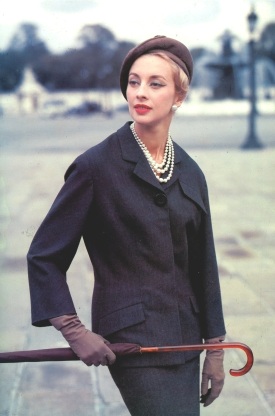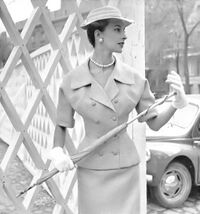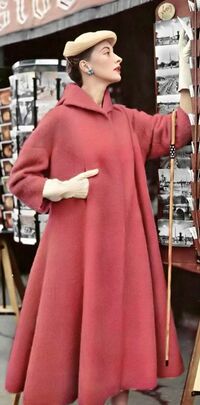Erika Ďileş
Erika Ďileş | |
|---|---|
 | |
| Minister of Foreign Affairs of Gylias | |
| In office 1 February 1962 – 5 March 1976 | |
| Prime Minister | Darnan Cyras |
| Personal details | |
| Born | 19 December 1918 Norenstal, Delkora |
| Died | 24 September 2007 (aged 88) Mişeyáke, Mişeyáke, Gylias |
| Political party | National Liberal Party |
| Other political affiliations | Liberal Party of Delkora (1933–1944) |
| Alma mater | University of Norenstal |
| Occupation |
|
Erika Ďileş (19 December 1918 – 24 September 2007) was a Gylian diplomat, politician, and media personality. She was Gylias' foreign minister in the Darnan Cyras government. She is considered Gylias' first successful foreign minister, and her tenure established the enduring foundations of Gylian foreign policy.
Born in Delkora, Erika was a career diplomat. She joined the Gylian diplomatic service after the Liberation War, and, critical of the conduct of her predecessor, was named foreign minister in 1962.
A skilled diplomat and charismatic hostess, Erika achieved the normalisation of Gylias' relations with the rest of Tyran. She based foreign policy on moral principles, and the responsibility to set an example as one of Tyran's most anarchist-influenced countries.
Preferring personal contact and shuttle diplomacy, Erika travelled heavily as foreign minister, making both official and private visits to other countries. Her tenure saw Gylias emerge as a middle power, a strong defender of democracy, human rights, social justice and international cooperation.
Famed for her bonne vivante personality and dry wit, she was among the most popular cabinet ministers of the Darnan Cyras government. A neat dresser and ardent francophone, she spared no expense to ingratiate herself with foreign governments, and gained some popularity in the countries she regularly visited. After leaving office, she wrote her memoirs and unexpectedly pursued a career as a television personality until her death.
Erika had a fundamental impact on Gylian foreign policy. Her lasting achievements include securing Gylias' place in the international community with no compromise to its far-left politics, and building a reputation as an honest actor and negotiator that remains the cornerstone of Gylian diplomacy.
Early life and education
Erika was born on 19 December 1918 in Norenstal, to Gylic parents who had left Xevden. She was registered at birth as "Erika Ďileş" (Delkoran: Erika Tjilesj), with the additional surname "Dahl" to fit in more easily.
Her parents were shopkeepers, and she had a comfortable childhood. She learned both her parents' native Yaskan and Aréş, and Delkoran in school, where she was known as "Erika Dahl".
From an early age, she was an avid reader and took an interest in foreign languages. She was a talented student, although she got in trouble in school for disrupting and mocking Vallyar rituals and skipping religious education classes.
Her first political experience was handing out flyers for the Liberal Party during the 1932 Federal Election. Both she and her parents were supporters of Sofia Westergaard. She joined the Liberals' youth wing the next year, and had an opportunity to meet Sofia after the 1936 Federal Election, and a much-reproduced photograph was taken of the two embracing. She remained loyal to the Liberals during the Liberal Party split of 1940, but let her youth wing membership lapse after she surpassed the age limit.
Erika attended the University of Norenstal, where she graduated with a degree in political science.
Diplomatic career

After completing university, Erika joined the Delkoran diplomatic corps. She worked for the Ministry of Foreign Affairs in 1945–1948 as an advisor on Sidurian affairs. She was appointed an attaché to the Delkoran embassy in Akashi in 1948. She fondly recalled the posting as "some of my happiest years": she became fluent in Miranian and a lifelong Miranophile.
She followed the Liberation War with particular interest during her diplomatic career, and was frustrated by Veidnar Albendor and Hjalmar Madsen's stance towards it. When it ended in 1958, she amicably resigned and moved to Gylias, joining its diplomatic service insteaad.
She was one of the Executive Committee's senior advisors on international organisations, and served as Gylias' permanent representative to the Organization of Tyrannic Nations in 1958–1961.
She was critical of Gylias' first foreign minister, Neóre Rouraþ. She felt Neóre cared more about ideological posturing than diplomacy. She shared her misgivings with Darnan Cyras, who invited her to join the cabinet and replace him.
She resigned as permanent representative in 1961, joined the National Liberal Party, and stood as a candidate in the 1962 federal election, becoming a member of the Chamber of Deputies from Kausania.
Minister of Foreign Affairs

Erika was appointed Minister of Foreign Affairs on 1 February 1962.
She ended Gylias' relative isolation during the National Obligation period. She pragmatically worked for good relations with the rest of Tyran, acknowledging when political differences with other countries were too great to bridge, while retaining a moral dimension to Gylian foreign policy.
Erika believed that Gylias has the responsibility to set an example as one of the most anarchist-influenced societies in Tyran. She based foreign policy on persuasion and negotiation, and used her charisma in the service of building Gylian soft power. She welcomed the thriving Gylian popular culture and its success abroad, placing an emphasis on cultural diplomacy.
She favoured personal and public diplomacy. She maintained an energetic schedule as foreign minister, travelling constantly. During foreign trips, she relished mingling with the general public. This open approach to diplomacy garnered her notable popularity among youth, who saw in her an embodiment of the reunion of utopianism and elegance associated with Gylias.
Erika established a reputation as an able negotiator. As a liberal, she sometimes allowed counterparts to form the impression she was more distanced from her leftist coalition partners, in order to reach agreements. As a "roving foreign minister", she was an articulate and graceful supporter and "explainer" of the Golden Revolution.
Erika's tenure fundamentally shaped Gylian diplomacy. She was instrumental in realising Gylias' special relationships with Cacerta, Kirisaki, and Delkora. She was a staunch supporter of the Common Sphere, and at times prioritised Gylias' membership in it to the detriment of its presence at the OTN.
She took a firm line against authoritarianism, trading barbs with Æþurheim's Futurist regime during a period with no official relations, and played a leading role in pushing the Common Sphere's foreign policy to pressure Quenmin during the Hidebound Era through sanctions and boycotts.
Public image

Erika was known for her bonne vivante image, shared with several cabinet colleagues and the ferroses, although she was not one of the chahuteuses ("rowdies") like Julie Legrand, Eðe Saima, and Birgit Eckstein.
She had a refined and charismatic personality and was a fastidious dresser. She leveraged these traits to entertain interlocutors and charm the public, an approach that foreign ministry staff dubbed "caviar diplomacy".
Through her consistent travel, she became one of the defining figures of the Golden Revolution to many non-Gylians, and was seen as a role model for the fusion of radicalism and elegance that became a defining trait of Gylias.
Fluent in French among other languages, Erika was a supporter of the francité movement and cultivated an explicitly French public persona, drawing on positive stereotypes of French sophistication and romanticism as well as slyly alluding to French revolutionary heritage.
She was particularly popular in Delkora, and maintenance of close Gylias-Delkora relations was a priority of her foreign policy. She helped organise Mette Elvensar's first official visit to Gylias, and insisted that Sofia Westergaard be part of it, in honour of her fame in Gylias. When Sofia was appointed Delkoran ambassador to Gylias in 1969, Erika received her credentials at the presentation ceremony, and the two then replicated their embrace from their 1936 election campaign photo.
Later career

Erika lost her seat in the 1976 federal election. She wrote her memoirs, published in 1978 as 14 Years and 1.400 Kilograms. Playing on her public image, the book used the literary conceit of recounting her diplomatic and government career beneath a veneer of tongue-in-cheek materialism.
She left politics entirely and instead pursued a career as a television presenter and media personality. This choice was well-suited to her personality and reputation, and garnered her a new fame. She worked mainly with ATV and later 5. Her work with 5 led her to become close friends with channel founder Marie-Agnès Delaunay. She specialised in hosting breakfast television shows and late-night discussion programmes.
She appeared in the 1999 documentary series Nation Building, discussing her experience as foreign minister and her memories of the Golden Revolution.
She retired from television in 2000, for medical reasons.
Death
Erika's health began to falter later in life. In the 1980s, she changed her diet and lost weight. She was diagnosed with early stage lung cancer in 2000, and had a successful surgery that removed it.
She died in her sleep on 24 September 2007, in her Mişeyáke apartment.
Personal life
Erika had a reputation as a "swinging young bachelorette" when she became foreign minister, and dated various people and had a string of romantic relationships, including a fling with erotic novelist Anaïs Nin and one with Sabina Amorosi. After leaving office, she grew closer to her friends' families, and often took an interest in their children's personal development and helped look after them.
She remained a gourmand and a sybarite throughout her life. She was particularly fond of French cuisine, wine, and champagne.